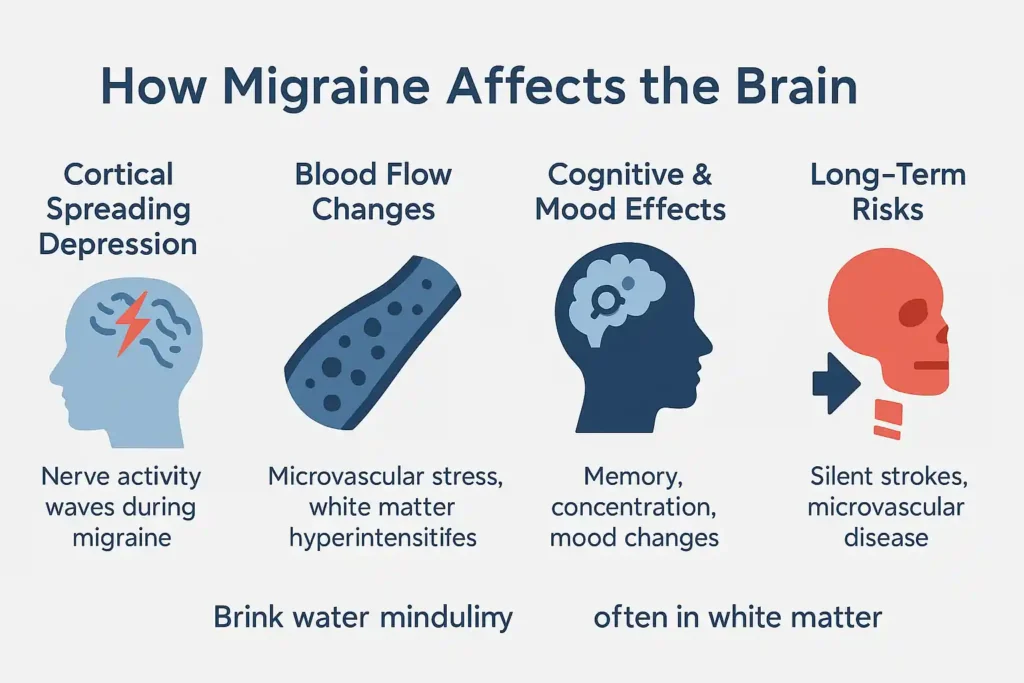Table of Contents
ToggleWhat Are Brain Lesions?
A brain lesion is an area where brain tissue is damaged. The damage can happen for many reasons. Injury, infection, inflammation, or reduced blood flow can all cause lesions. They may be large or tiny. They may appear in different brain regions.
Some lesions are harmless. They are usually identified when a brain scan is performed for a different reason. Others can change how a person thinks, feels, moves, or speaks.
Doctors often use MRI or CT scans to detect brain lesions. These scans show the size, shape, and location of the damage.
Causes of brain lesions include:
- Strokes
- Multiple sclerosis
- Tumors
- Head injuries
- Chronic medical problems
- Long-term migraine headache issues
When brain lesions appear in people with migraines, doctors start asking: are migraines to blame?
Do Migraines Cause Brain Lesions?

Migraine is not a simple headache. It is a neurological disorder that can impact the brain’s blood flow and nerve activity. Some people have migraines once in a while. Others face them several times a month.
Studies show that people with migraines, especially those with aura are more likely to have small, bright spots on MRI scans. These spots are called white matter hyperintensities. They are a kind of headache-related brain pathology.
Not every expert agrees on the cause. Some think these spots come from vascular changes in the brain during migraine attacks. Others believe people with migraines have brains that are more sensitive to changes in blood flow.
Frequent migraine attacks can place stress on tiny brain vessels. Over time, this can result in micro-damage, small areas of dead or weakened tissue.
What’s the Link Between Migraines and Brain Lesions?
When a migraine begins, changes happen in the brain. One process that can occur is cortical spreading depression. This is a slow wave of nerve activity followed by reduced activity. Blood flow to certain areas changes as a result.
These changes are not harmful in the short term for most people. But repeated episodes over years may be a different story.
Key points from neuroimaging in migraine research:
- Individuals with migraine accompanied by aura have a higher prevalence of migraine aura and MRI changes than those without aura.
- Lesions often appear in the brain’s white matter, the tissue that helps connect brain regions.
- Lesions are more frequently observed in the posterior region of the brain, which is responsible for visual processing.
- Women with migraines are more likely to show these changes, possibly due to hormonal effects.
Some experts link these lesions to cerebral microvascular disease. This is a problem with small brain blood vessels. Over time, microvascular disease can increase the risk of strokes.
How Do These Brain Lesions Affect Your Health?
Not all lesions cause problems. Many are silent, meaning you can have them and never know. But in some cases, they can affect:
- Memory
- Concentration
- Balance
- Mood
Some research shows a link between migraine-related lesions and silent strokes and migraines. Silent strokes do not cause immediate symptoms but can still damage brain tissue. Multiple silent strokes over time can impact thinking skills and daily function.
Frequent migraines may be a warning sign that your brain health needs attention. Even if lesions are not causing problems now, they may contribute to recurrent headaches and brain health issues in the future.
Can You Prevent Brain Lesions from Migraines?
The best prevention is reducing migraine frequency and severity. Fewer attacks mean less stress on brain vessels and less risk of damage.
Steps to lower your risk include:
- Following your doctor’s plan for migraine treatments. This may include daily preventive medicine or fast-acting drugs for attacks.
- Keeping a regular sleep schedule.
- Drinking enough water every day.
- Eating balanced meals and not skipping food.
- Managing stress through relaxation or breathing exercises.
- Avoiding known migraine triggers.
Early treatment works best. If you wait until migraines become severe and frequent, damage risk may increase.
More on Migraine & Headaches
Herbal Supplements for Migraine: What to Know
Some people try herbal options for migraine relief. Butterbur, feverfew, magnesium, and riboflavin are some of the most researched options. While some may help, they are not risk-free. Always ask your doctor before using them. These can interact with other medications or lead to adverse effects.
Tips to Manage Your Migraine Headaches
Good migraine control starts with knowing your triggers. Keep a migraine diary. Write down what you eat, how you sleep, stress levels, and when attacks happen. This helps find patterns.
During a migraine, try these steps for comfort:
- Rest in a quiet, dark room.
- Use a cold pack on your forehead.
- Take your medicine early in the attack.
If attacks happen often, talk to your doctor about preventive migraine treatments.
What Are Migraine Symptoms and Causes?

So, the causes of migraines are complex, and not yet identified. Triggers can include:
- Stress
- Hormonal changes
- Certain foods
- Weather changes
- Bright lights or loud sounds
Common migraine symptoms:
- Pulsating pain may occur on one or both sides of the head.
- Nausea or vomiting
- Sensitivity to light or sound
- Visual changes before or during the attack (aura)
Knowing what migraine is and how it affects you is key to getting better control.
The Bottom Line
Migraines are more than pain in your head. They are a brain condition that can change how your brain looks on a scan. Brain lesions linked to migraine may not always cause problems now, but they can be signs that your brain’s small blood vessels are under stress.
Prevention is possible. With the right migraine treatments, healthy habits, and regular medical care, you can protect your brain and lower your risk of long-term damage.
If you have frequent migraines, don’t ignore them. Your brain health may depend on it.
FAQs
What are the 5 C’s of migraines?
They usually refer to five common migraine triggers: caffeine, chocolate, cheese, citrus, and cured meats. Avoiding these can sometimes reduce migraine headache frequency, but triggers vary from person to person.
How serious is a lesion on the brain?
The seriousness of a brain lesion depends on its size, location, and cause. Some are harmless and require monitoring, while others may need treatment to prevent lasting neurological complications of migraine.
Is there a link between migraines and brain tumors?
Migraine does not cause brain tumors. Both can cause headaches, so doctors may recommend scans to rule out tumors and ensure accurate diagnosis when symptoms overlap or appear concerning.
What brain disorders cause migraines?
Several conditions can lead to migraine attacks, including multiple sclerosis, past strokes, and certain vascular changes in the brain. Treating these conditions can sometimes help reduce migraine headache episodes.
What brain lesions are associated with migraines?
Most migraine-related lesions are white matter hyperintensities found on MRI scans. They are often linked to small blood vessel changes and may appear more often in people with migraine aura and MRI changes.
What mental illness is linked to migraines?
Anxiety and depression occur more often in people with migraines. Emotional stress can trigger attacks, making migraine treatments important for both brain health and mental well-being.
Can brain lesions be cured?
Some brain lesions heal naturally, while others remain permanent. The main goal is to prevent more lesions from forming through early migraine treatments and protecting overall brain health over time.
Are white matter lesions permanent?
Many white matter hyperintensities stay for life. While they can’t always be reversed, controlling migraines and improving vascular health can prevent new lesions and protect long-term brain function.
About The Author

Medically reviewed by Dr. Chandril Chugh, MD, DM (Neurology)
Dr. Chandril Chugh is a U.S.-trained, board-certified neurologist with expertise in diagnosing and managing neurological disorders, including migraines, epilepsy, Parkinson’s disease, and movement disorders. His clinical focus includes evidence-based neurological care and patient education.
All content is reviewed for medical accuracy and aligned with current neurological guidelines.




